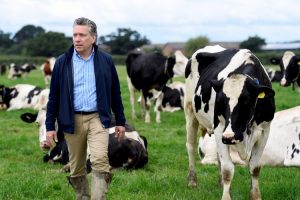
At almost 1.4 billion people, India has the second-largest population in the world. It also has one of the fastest-growing economies and is expected to have the second-biggest by 2050.
As such, the UK’s chief negotiator, international trade secretary Anne-Marie Trevelyan, described a deal as a “golden opportunity”.
British agriculture could be among the beneficiaries, according to the AHDB’s senior policy analyst, Amandeep Kaur Purewal.
Ms Purewal said there was “hardly any” trade at the moment between India and the UK’s beef, sheep, pork, dairy and cereals sectors.
This was due to tough market protection regulations, including high average tariff rates and a large number of non-tariff measures.
“The UK could potentially benefit on this front if a free-trade agreement is agreed and these protection measures are removed,” said Ms Purewal. And the potential increases when the rising population and economic growth are taken into account.
Dairy, in particular, could capitalise on developing demand from a growing middle class that has an appetite for added-value products such as cheese.
Stumbling blocks
But there were stumbling blocks to surmount, Ms Purewal said.
Other countries had tried and failed to agree meaningful trade deals with the Indian government – notably Australia.
Among the main difficulties are India’s stringent sanitary and phytosanitary standards.
These are complex and challenging for agri-food firms wishing to export to India, Ms Purewal explained.
“The free-trade agreement will seek to enhance access for agri-food by increasing transparency of sanitary and phytosanitary standards in order to help UK firms trade more easily,” she said.
Human rights
In previous trade deals with New Zealand and Australia, animal welfare standards have been a major discussion point. But the UK-India agreement is more likely to focus on human rights.
The Indian government has been locked in a battle with its farmers over a contentious farm bill. Many farmers lost their livelihoods and the suicide rate has been high.
Although the situation has eased, the protests may yet have a bearing on any deal.
That is because the UK government’s trade bill includes amendments that ensure any agreements with other countries meet requirements on human rights and genocide.
The government must conduct a risk assessment to determine whether a trade agreement complies with the UK’s human rights obligations.
It must also produce annual reports to parliament to examine any alleged cases of violation, Ms Purewal said.
Current UK-India trade situation
Agriculture accounted for 16% of India’s economy in 2019 compared to the UK’s farm sector of just 0.6% to the economy. Main Indian food exports are rice, fish, seafood, spices and buffalo meat.


























